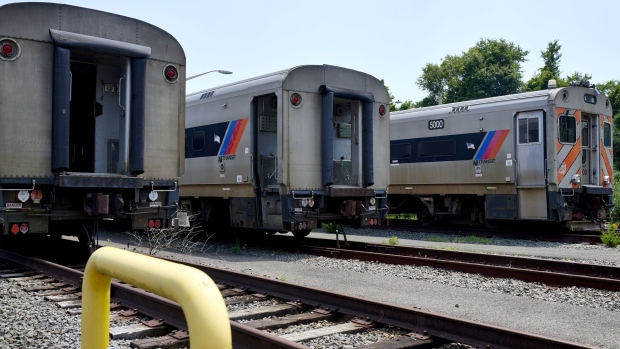Mar 14, 2022
NJ Transit Sees $550 Million Hole When Covid Aid Declines
, Bloomberg News

(Bloomberg) -- New Jersey Transit is projecting a $550 million revenue shortfall in fiscal 2026 even with federal Covid-19 aid and more customers returning post-pandemic.
The forecast, part of a budget proposal notice for the legislature that’s up for a vote Monday night at the board of directors’ monthly meeting, assumes no fare increases for the next four years. It counts on annually shifting $82 million from a clean-energy fund and $362 million from capital needs to day-to-day-operations, for a total of $1.77 billion -- a practice from prior administrations and repeated by Governor Phil Murphy even after he criticized it as poor budgeting.
The hole in fiscal 2026, which starts on July 1, 2025, is more than double an anticipated $216.8 million in Covid aid and 17% higher than than an expected handover of $470 million in toll revenue from the New Jersey Turnpike. The gap is listed as “funding needed” in exhibits for tonight’s meeting.
Murphy, a 64-year-old Democrat and retired Goldman Sachs Group Inc. senior director, began his second term in January. Among his renewed commitments was to turn around NJ Transit bus and rail after years of budget cuts left the nation’s largest statewide mass-transportation provider less safe and increasingly unreliable.
“It would be premature at this time to speculate on a FY26 operating budget,” NJ Transit spokeswoman Nancy Snyder said in an email.
Slow Return
A key pipeline for New York City jobs, NJ Transit took the hardest budget hit in its history when ridership fell 90% in April 2020, amid pandemic business shutdowns. About 50% of customers have returned. To keep fares steady for a fifth straight year, the agency is proposing the use of $429 million in Covid aid in fiscal 2023.
That aid will climb to $738.7 million in 2024 and stay about level in 2025. In fiscal 2026, though, the federal funding would drop to $217 million. At that time, NJ Transit expects ridership to hit 90% of its pre-pandemic level, Snyder said in a separate email.
NJ Transit President Kevin Corbett “believes ultimately ridership will return to pre-pandemic levels at some point,” Snyder said. His budget notice, meanwhile, projects that 10% to 15% of passengers will have remote or flexible work arrangements.
NJ Transit has a $2.6 billion operating budget for the year that ends June 30. The agency relies on fares for about 45% of its revenue, double the percentage used by New York’s Metropolitan Transportation Authority.
New Jersey mass-transit advocates for at least 10 years have called for a steady state revenue stream to relieve some of the pressure for higher fares. In a telephone interview on March 9, Murphy said he was satisfied with the Turnpike tolls arrangement for $3.57 billion over seven years, approved by his administration 11 months ago.
“It runs long after I’m gone,” Murphy said. “That’s real -- I mean, that is significant, and it’s a memorandum of understanding. People ask me a lot about a dedicated source of funding -- which, again, I’ve said from Day 1 I like that idea. I haven’t talked enough about the fact that it kind of exists.”
He added, though, that a “real, dedicated source would need a constitutional amendment.”
“Is that something that I’d be open to?” Murphy said. “I guess, but boy, we’ve got a pretty significant MOU in place right now with the Turnpike Authority.”
©2022 Bloomberg L.P.


